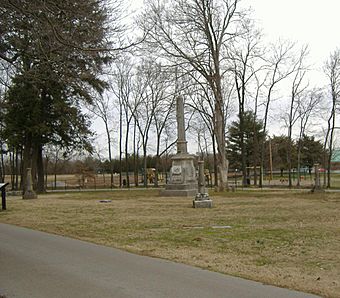Confederate Monument of Bowling Green facts for kids
Quick facts for kids |
|
|
Confederate Monument of Bowling Green
|
|
 |
|
| Lua error in Module:Location_map at line 420: attempt to index field 'wikibase' (a nil value). | |
| Location | Bowling Green, Kentucky |
|---|---|
| MPS | Civil War Monuments of Kentucky MPS |
| NRHP reference No. | 97000665 |
| Added to NRHP | July 17, 1997 |
The Confederate Monument of Bowling Green is a special statue located in Bowling Green, Kentucky. It's one of many monuments in Kentucky that remember the Civil War. This monument became part of the National Register of Historic Places on July 17, 1997. You can find it inside Fairview Cemetery, on the older, northern side.
Contents
What the Monument Looks Like
The monument is made from white limestone, a type of rock found nearby. It cost $1,500 to build, which was a lot of money back then! People raised the money between 1875 and its dedication day on May 3, 1876.
Main Statue Details
The main part of the monument is a tall, pointed pillar called an obelisk. It stands thirty feet (about 9 meters) high. A carved Confederate flag appears to be draped over it.
On the front of the monument, there's a special carving called a bas-relief. It shows a scene from a famous painting by Henry Mosler. This painting was popular after the Civil War. It showed how homes in the South were damaged during the war. Other sides of the monument also have different carvings.
Cannons and Cannonballs
About twenty feet (6 meters) away from each corner of the main monument, there are statues of cannons. These cannons point straight up and are eight feet (2.4 meters) tall. You can also see carved cannonballs around the bottom of these cannon statues.
About the Marker
In front of the monument, there's a marker that tells about it. However, it has a couple of small mistakes! It says that Thomas Hines couldn't attend the dedication because he had died. But actually, he lived for another twenty-two years! His grave is even in the same cemetery. The marker also spells Henry Mosler's name incorrectly as Thomas Moseler.
Around the monument, you'll find the graves of seventy Confederate soldiers. Some of these soldiers are not identified.
History of the Monument
This monument was built thanks to the efforts of a man named George B. Payne. In 1875, he lived in Kansas. But during the Civil War, he served in the Confederate 4th Kentucky Infantry. He spent a lot of time around Bowling Green as a messenger for General John C. Breckinridge. He really wanted a monument to honor the Confederate soldiers buried in the cemetery.
Starting the Project
Because of his idea, the Warren County Monumental Association was formed. Thomas Hines, who had been a spy during the war, became its president. Many people supported building the monument. This support grew partly because of actions by Union General Stephen G. Burbridge. In 1864, twenty-two people from Warren County died due to his orders. Before this, the Union had more support in the county. However, the Confederate government of Kentucky briefly stayed in Bowling Green from 1861 to 1862.
Dedication Day
Over ten thousand people came to the monument's dedication! The main speaker was William Campbell Preston Breckinridge. He had served as a colonel during the war. He also helped create many groups for former Confederate soldiers.
There is one other Civil War monument at Fairview Cemetery. It is called the William F. Perry Monument.
Gallery



